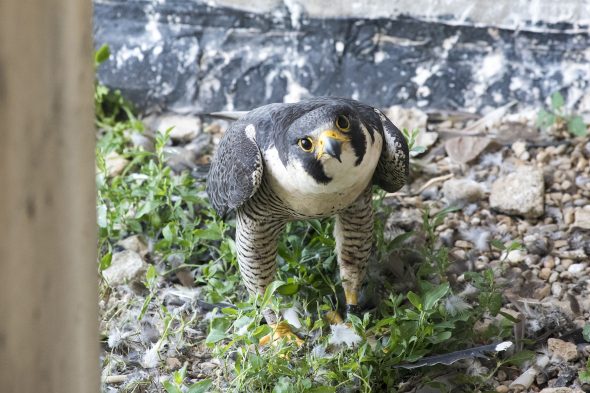Resident raptors return to UH
UIC’s favorite feathered friends aren’t afraid of a little construction.
The urban raptors, called peregrine falcons, have been nesting atop University Hall since 1999, hatching nearly 40 chicks over the past 20 years. This year, despite ongoing restoration projects, they’re back — sometimes. Watch them live on the FalconCam.
“Courtship starts in February,” said Mary Hennen director of the Chicago Peregrine Program.
The pair, spotted on campus since early February, are coming and going to stake their territory and mate before nesting happens in mid-March or April.
Construction teams leading a window restoration project at University Hall are mindful of this timeline.
“They are working with us to understand the peregrines,” said Hennen, collections assistant in the Field Museum’s bird division.
Window restorations began last year, but the UIC peregrine pair, Nitz and Mouse, still returned to campus, laying three eggs on the ledge.
This spring should be business as usual. The area where the peregrines will nest is scheduled last for window replacement.
“I don’t see [the project] inadvertently affecting or changing the birds’ behavior in any way,” Hennen said.
That’s important for UIC because the campus community has a special history with the falcons. UH was a release site for the formerly at-risk group in the 1980s. Falcons began to use the building for nesting in 1999. Since then, they have been removed from both the federal (1999) and state (2015) endangered and threatened species list.
But fans eager to see some chicks should be patient.
Although the currently unidentified birds could be Nitz and Mouse, Nitz, the female, turns 17 this spring. The average lifespan for wild peregrine falcons is 16 to 20 years, and Nitz’s last three eggs didn’t hatch.
“She’s an older bird,” Hennen said. Age could be a factor, but Hennen and her team are not sure why the brood was unsuccessful.
Nitz also runs the risk of having a younger bird “out compete her for the territory,” said Hennen. “The nesting season tends to be a little later for a new bird or new pair.”
Hopes are high for this brood.
“I am delighted that the falcons are back on my window ledge on the 28th floor,” said Provost and Vice Chancellor for Academic Affairs Susan Poser. “They have become an integral part of the provost’s office and I’m looking forward once again to seeing the eggs grow and hatch and then welcoming a new flock of grandfalcons into the world.”

